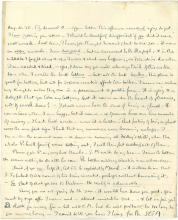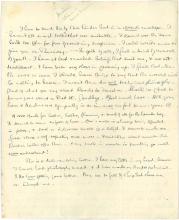BRACERS Record Detail for 18687
To access the original letter, email the Russell Archives.
"My Dearest O.—Your letter this afternoon was such a joy to get."
[Letter is not signed.]
Letter 75
BR TO OTTOLINE MORRELL, 21 AUG. 1918
BRACERS 18687. ALS. Texas
Previous Brixton letter, BRACERS 47455; next letter, BRACERS 80396
Edited by K. Blackwell, A. Bone, N. Griffin and S. Turcon
<Brixton Prison>1
Aug. 21. ’18.
My dearest O.
Your letter this afternoon2 was such a joy to get. I love getting your letters — I should be dreadfully disappointed if you didn’t come next week. Last time, I hear,3 you thought I wasn’t glad to see you — it was an utter mistake. I was delighted — but embarrassed by the other people — and in the middle I forgot where and who I was and what was happening, as I sometimes do when I am excited and tired. — Yes, I dare say you will always think of this as the time when I wrote the best letters — but not the best books. This place is good for letters, but not for serious creative efforts like books. I never can value my thoughts unless they are in a permanent and public form. It is a joy and a delight that you like my letters, but it comes under the head of pleasure, not of work done! — I shall never lose the sense of being a ghost.4 It comes less when I am happy, but it comes — and of course here one has moods of misery — I had last week — now it is better. That feeling of being a ghost was the very first sign I had that my marriage was becoming unhappy. I remember the moment now — a summer evening at Friday’s Hill, when the whole P. Smith family5 were sitting out, I with them, but suddenly not of them.
Please give P.6 my very best thanks. G.M. wrote to my brother.7 I saw the letters. He seems willing to do all he can. The better military situation8 is an advantage.
Don’t, if you can help it, let S.S. be exploited by Marsh.9 — It is clear to me that S.S’s hatred of sex comes of his being inverted,10 perhaps without knowing it. — So glad of what you say of Dickens.11 He really is admirable.
Sorry you are not going to the sea12 — it would have done you good. You must try and go after I come out — about middle Oct. — and let me join you? I shall go awaya for a bit with C.M. but she will probably be too busy to go away long. I can’t tell you how I long for the SEA.
I have to send this by Miss Rinder but in a closed envelope. I haven’t got enough books13 that are suitable. I daren’t use the same book too often for fear of rousing suspicion. I will write more to give you on Thursday. — In spite of all, I feel a kind of renewal of youth. I have at last reached beliefs that suit me, and are not traditional. I have been very slow in growing up. I feel that when the war is over I shall have things to say that the world will be willing to hear — I won’t then do only technical philosophy. Glad of what you say about Roads to Freedom. Shall be glad to know your views on Part II.14 Goodbye. Much much love. All your love and kindness and sympathy is an immense comfort to me.
Your
B.
A 1000 thanks for letters, books, flowers, and most of all for the lavender bag. It seemed to come so full of love. One’s nose is always being offended in prison, and such a delicious smell is a delight. It seems to make one feel clean and self-respecting once more. Don’t bother about novels. Miss Rinder looks after them — and my taste in novels is something you could never understand!
This is a dull rambling letter. I have very little in my head, because I have had philosophy to read and it has made my thoughts technical. I do love getting your letters — they are so full of things that cheer me and interest me.
- 1
[document] The letter was edited from digital scans of the unsigned, single-sheet original in BR’s hand in the Morrell papers at the University of Texas at Austin. The sheet was evidently folded three times.
- 2
Your letter this afternoon Dated 17 August 1918 (BRACERS 114755).
- 3
Last time, I hear Ottoline wrote in her Memoirs: “I remember on one of my visits I felt that he was almost longing to get rid of us so that he might read a letter she <Colette> had sent him in a book, which he kept under his hand on the table during our visit” (Ottoline at Garsington, ed. R. Gathorne-Hardy [London: Faber and Faber, 1974], p. 253). Extant correspondence from Frank, Colette and Gladys Rinder does not disclose who informed BR of this. It was likely passed on to him in a prison visit.
- 4
never lose the sense of being a ghost BR was responding to Ottoline’s reaction to his confession of feeling like a ghost in Letter 66. She wrote: “I thought you had broken Through The feeling of being a Ghost — and that your happiness lately had helped you to feel really in Touch with humanity — but moods vary and I don’t suppose you could ever quite lose the ghost-feeling. Too much of you is consecrated or absorbed<?> by Infinite abstract creation” (17 Aug. 1918, BRACERS 114755).
- 5
summer evening at Friday’s Hill … when the whole P. Smith family BR was, understandably, a frequent visitor to Friday’s Hill, the house on Haslemere Road, Sussex, where the Philadelphia Quakers Robert and Hannah Pearsall Smith settled in 1889 with their son, Logan, a literary critic, and daughter Alys, BR’s first wife. Even the census of 1891 found him there. For four years from January 1896 (a year after their marriage), BR and Alys lived at The Millhangar cottage in the nearby village of Fernhurst, and the event probably took place before his estrangement from Alys. However, even the year of the evening in question is unknown.
- 6
P. Philip Morrell was thanked for his taking up the fellowship issue with Gilbert Murray.
- 7
G.M. wrote to my brother The letters in question are not extant in Frank’s papers in the Russell Archives or in Murray’s in the Bodleian.
- 8
better military situation Early Allied gains in the second Battle of the Marne (see note 21 to Letter 44) had turned into a major strategic victory. Although this forward movement stalled on 6 August, only two days later a new attack (the Battle of Amiens) was successfully launched from a different sector of the Western Front. This action was the first in a series of Allied assaults, which rapidly pushed the German army into retreat across the entire front and resulted, barely 100 days later, in the signing of the Armistice.
- 9
S.S. be exploited by Marsh The senior civil servant Edward Marsh (1872–1953) was an enthusiastic promoter and anthologizer of modern English verse. Siegfried Sassoon was one of the war poets to feature in a fourth volume of the series edited by Marsh, Georgian Poetry, 1918–1919 (London: Poetry Bookshop, 1919). Marsh was also BR’s former friend turned bitter enemy (see note 3 to Letter 85).
- 10
his being inverted I.e., Sassoon’s homosexuality.
- 11
So glad of what you say of DickensOttoline wrote: “I think Dickens is The writer!! — Am reading David Copperfield to Julian <her daughter>, and am overcome by its Life, its Vitality, and humour. It really is jolly and good. He was a stunner wasn’t he? — and I always scoffed at him — so ignorant was I! I live and learn tho —” (17 Aug. 1918, BRACERS 114755).
- 12
Sorry you are not going to the seaOttoline had cancelled the week in Swanage she was planning to spend with painters Dorothy Brett and Mark Gertler (and others), beginning on 16 August. “Rooms impossible to find and not worth expense”, she told BR the next day (BRACERS 14755).
- 13
enough booksOttoline’s note at the top of side 2 of the letter: “He would hide letters in an uncut Magazine”, in addition to books.
- 14
Glad of what you say about Roads to Freedom. Shall be glad … Part II “I have just received Roads to Freedom — and have read 1st part only — It seemed to me quite excellent. I will add what I think of 2d. part. It is so tremendously just and salient and concentrated” (17 Aug. 1918, BRACERS 114755). She wrote BR about the second Part on 25 August: “I read Part II of Road <sic> to F. with Tremendous Interest and you had read it to me before. It is I think frightfully good — so full of ideas and feeling — and most inspiring — I loved the chapter on Art” (BRACERS 114756).
Textual Notes
- a
I shall go away “I” written over “Or”.


